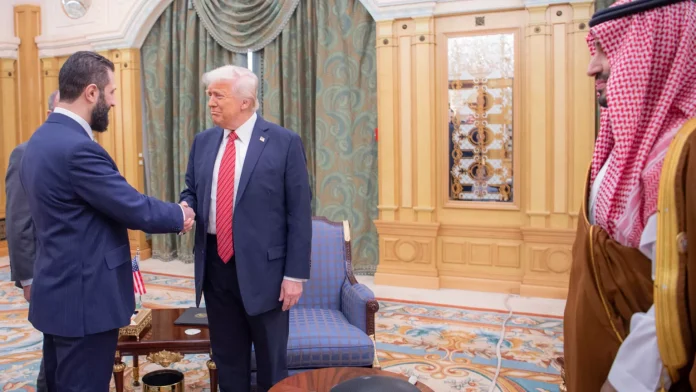Trump’s decision to lift sanctions on Syria surprised even his own officials. The president made the announcement during his visit to Riyadh, opening the door for Syria’s reintegration into the global fold after the fall of Bashar al-Assad’s regime in 2024. The headlines highlighted multi-billion-dollar contracts and lavish displays, but these should not overshadow the unexpected diplomatic shift.
Syria’s response was immediate. Thousands of people gathered in cities like Damascus and Aleppo, waving flags and chanting. They were filled with a sense of hope for the country’s future. For a nation that has endured over a decade of war, this moment felt historic. Many compared it to the joy of seeing Assad’s regime collapse.
Sharaa’s political transformation
This move also marks a significant win for Syria’s new president, Ahmed al-Sharaa. Caitlin Allen from Reaction (London) noted that it’s unusual for a US president to praise a leader with such a controversial past. Sharaa, who once fought American troops in Iraq and had a $10 million US bounty on his head, seems to have changed. His group helped overthrow Assad, and Sharaa has since dropped his alias, Abu al-Jolani. He now promises to lead Syria to freedom and tolerance.
Like many Middle Eastern leaders, Sharaa has found ways to appeal to Trump. Reports suggest he offered American companies exploration rights to Syria’s resources and even suggested building a “Trump Tower” in Damascus.
Gulf states’ influence on US foreign policy
Some critics believe Trump’s embrace of Sharaa is unwise. Clemens Wergin, in Die Welt (Berlin), cautioned that such alliances often lead to disappointment. Movements that rise to power can become authoritarian, as seen with Egypt’s Muslim Brotherhood and Turkey’s Erdogan. The Syrian rebel factions still include dangerous elements, as evidenced by recent massacres of Alawite and Druze minorities. Some argue Trump should have maintained pressure on the regime to keep it moderate.
However, many argue that Gulf states, especially Saudi Arabia, the UAE, and Qatar, are heavily influencing Trump’s actions. Simon Tisdall, in The Guardian (London), pointed out that these countries have gained increasing power over US foreign policy. During Trump’s visit, they flattered him with fighter-jet escorts and lucrative Boeing deals. Trump now relies on these petromonarchies to keep oil prices low and secure vast investments in the US. All three states pushed for the sanctions to be lifted, and Trump complied. As he made the announcement, Trump gestured to Saudi Crown Prince Mohammed bin Salman and said, “Oh, what I do for the crown prince!”
The price for Netanyahu’s alliance with Trump
One casualty in this shift is Israeli Prime Minister Benjamin Netanyahu. According to Ben Sales in The Times of Israel (Jerusalem), Netanyahu finds himself sidelined by Trump’s changing policies. Trump first began talks with Iran, then brokered a truce with the Houthi rebels in Yemen. Now, Netanyahu watches as Trump extends support to a leader he still considers a “jihadist.”
Shai Golden, in Israel Hayom (Tel Aviv), argued that Netanyahu made a mistake by aligning too closely with Trump. He believed Trump was the most “pro-Israel” president in history, but Trump’s decisions now prove otherwise. Netanyahu’s reliance on Trump has left him powerless, watching events unfold like a mouse in a gilded cage.
